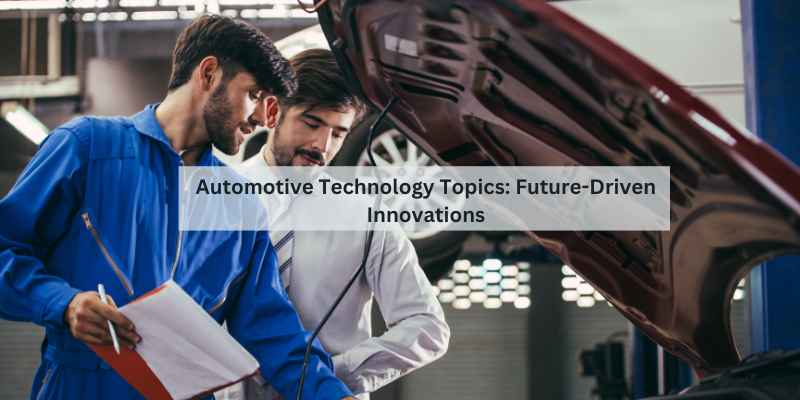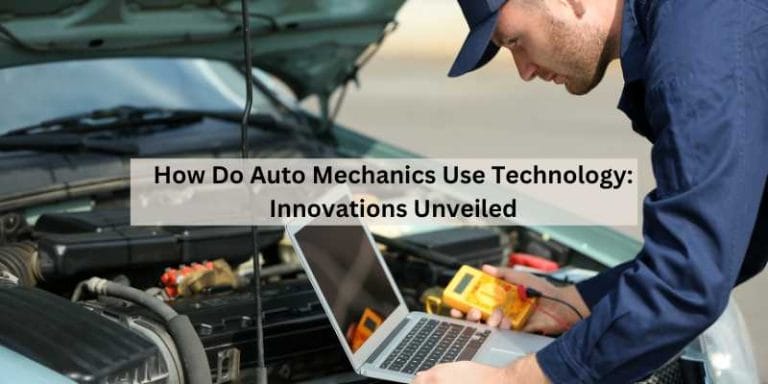Automotive Technology Topics: Future-Driven Innovations
Automotive technology encompasses the study and development of vehicle technology, including engineering, mechanics, and computer systems. It involves the construction, maintenance, and repair of self-propelled vehicles, utilizing various power sources such as diesel, electric, and gasoline.
The field of automotive technology is a dynamic and rapidly evolving sector that plays a crucial role in shaping the future of transportation. From advancements in autonomous vehicles to electric car technologies, the industry is continuously pushing the boundaries of innovation.
With an emphasis on efficiency, safety, and sustainability, automotive technology is at the forefront of revolutionizing the way we drive and commute. As the demand for greener and smarter mobility solutions continues to grow, the importance of automotive technology in shaping the future of transportation cannot be overstated. Whether it’s the development of intelligent all-wheel drive systems or the integration of augmented reality windshields, the possibilities within this field are endless.
Electrification Of Vehicles
The electrification of vehicles has revolutionized the automotive industry, paving the way for a more sustainable and environmentally friendly future.
Trends In Electric Vehicle Technology
Electric Vehicle (EV) technology continues to advance rapidly, with innovations in battery technology and charging infrastructure driving the market.
Impact On Environment And Climate Change
Switching to electric vehicles significantly reduces greenhouse gas emissions, helping combat climate change and improve air quality.
Autonomous Driving
Autonomous driving, also known as self-driving technology, is revolutionizing the automotive industry by enabling vehicles to operate without human intervention.
Advancements In Self-driving Cars
Self-driving cars are equipped with advanced sensors, artificial intelligence, and machine learning algorithms to navigate roads autonomously.
- Enhanced sensors provide real-time data for precise decision-making.
- Artificial intelligence enables the vehicle to interpret and respond to its environment.
- Machine learning algorithms improve performance over time through experience.
Safety And Ethical Considerations
Ensuring the safety and addressing ethical concerns are crucial aspects of autonomous driving technology.
- Safety: Self-driving cars aim to reduce accidents caused by human error.
- Ethical: Issues such as liability, decision-making in emergencies, and data privacy need to be addressed.
Connectivity And Infotainment
Welcome to our exploration of Connectivity and Infotainment in the world of automotive technology. In today’s fast-paced world, vehicles are becoming increasingly connected, offering a wide range of entertainment and information options to drivers and passengers alike.
The Rise Of Connected Cars
In recent years, connected cars have revolutionized the automotive industry. These vehicles are equipped with advanced technologies that enable them to connect to the internet and other devices, providing a seamless and convenient driving experience. From GPS navigation and real-time traffic updates to remote vehicle monitoring and control, connected cars have transformed the way we interact with our vehicles.
Developments In In-car Entertainment
When it comes to in-car entertainment, the possibilities are endless. Modern vehicles offer a plethora of entertainment options, including streaming services, personalized playlists, and high-quality audio systems. Additionally, advancements in infotainment systems have led to the integration of voice recognition, touchscreen displays, and even augmented reality features, enhancing the overall driving experience.
Alternative Fuel Sources
When it comes to the future of automotive technology, the focus on alternative fuel sources has become increasingly important. As the world seeks to reduce its reliance on traditional fossil fuels, the automotive industry is exploring new and innovative ways to power vehicles. From hydrogen fuel cells to biofuels and synthetic fuels, the development of alternative fuel sources is shaping the future of transportation.
Hydrogen Fuel Cells
Hydrogen fuel cells are a promising alternative to traditional gasoline-powered engines. These fuel cells generate electricity by combining hydrogen and oxygen, producing water as the only byproduct. This clean and efficient process makes hydrogen fuel cells an environmentally friendly option for powering vehicles.
Biofuels And Synthetic Fuels
Biofuels, such as ethanol and biodiesel, are derived from organic materials and offer a renewable alternative to traditional fuels. These fuels can be produced from agricultural crops, waste oils, and other sustainable sources. Synthetic fuels, on the other hand, are artificially produced and can be tailored to meet specific performance and environmental criteria, offering a versatile alternative for powering vehicles.
Advanced Driver-assistance Systems (adas)
Advanced Driver-Assistance Systems (ADAS) have revolutionized automotive technology, bringing a new era of safety and convenience to the roads. ADAS is a collection of electronic systems that assist the driver in operating the vehicle and provide enhanced safety features. These systems utilize advanced sensors and technologies to monitor the vehicle’s surroundings and react to potentially hazardous situations, thereby reducing the likelihood of accidents.
Key Features Of Adas
ADAS incorporates a range of cutting-edge features designed to enhance driving safety and comfort. These include:
- Lane Departure Warning: Notifies the driver if the vehicle begins to drift out of its lane.
- Adaptive Cruise Control: Automatically adjusts the vehicle’s speed to maintain a safe following distance.
- Automatic Emergency Braking: Engages the brakes to prevent or mitigate collisions.
- Blind Spot Monitoring: Alerts the driver to the presence of vehicles in the blind spot.
- Collision Avoidance Systems: Utilizes sensors to detect potential collisions and take corrective actions.
Integration With Smart City Infrastructure
ADAS technology is evolving to integrate with smart city infrastructure, creating a more connected and safer urban environment. Through the utilization of vehicle-to-infrastructure (V2I) and vehicle-to-everything (V2X) communication, ADAS-equipped vehicles can receive real-time data from traffic signals, road signs, and other infrastructure elements. This integration enables ADAS to anticipate and respond to traffic conditions, enhancing overall safety and traffic efficiency.
Vehicle-to-everything (v2x) Communication

Vehicle-to-Everything (V2X) Communication is revolutionizing the automotive industry, enabling vehicles to communicate with each other, infrastructure, pedestrians, and other road users. This technology holds the key to safer, more efficient transportation systems and has the potential to transform the way we travel.
How V2x Enhances Traffic Efficiency
V2X technology plays a crucial role in enhancing traffic efficiency by facilitating real-time communication between vehicles and infrastructure. This enables vehicles to receive traffic signal information, anticipate traffic flow, and optimize routes, leading to reduced congestion and smoother traffic flow. Furthermore, V2X enhances safety by providing warnings about potential hazards and enabling proactive collision avoidance, thereby improving overall traffic management.
Security Challenges In V2x
Despite its numerous benefits, V2X communication also faces significant security challenges. The interconnected nature of V2X networks makes them susceptible to cyber-attacks and unauthorized access. Ensuring the integrity and confidentiality of the transmitted data, as well as safeguarding the privacy of individuals, presents a complex set of security challenges that must be addressed to realize the full potential of V2X technology.
Lightweight Materials And Design
When it comes to automotive technology, Lightweight Materials and Design play a crucial role in shaping the future of vehicles.
Innovations In Material Science
With advancements in material science, automotive engineers are exploring innovative lightweight materials such as carbon fiber and aluminum alloys.
Effects On Fuel Efficiency And Dynamics
The use of lightweight materials enhances fuel efficiency by reducing the overall weight of the vehicle, leading to improved dynamics and performance.
Battery Technology And Energy Storage
Battery technology and energy storage play a crucial role in the advancement of automotive technology. From breakthroughs in battery life to sustainable disposal and recycling methods, innovations in this area are shaping the future of transportation.
Breakthroughs In Battery Life
Recent advancements have led to longer-lasting batteries, enhancing the range and performance of electric vehicles. Improved battery life means fewer charges and increased efficiency, making electric cars a more viable option for consumers.
Sustainable Battery Disposal And Recycling
Proper disposal and recycling of batteries are essential to minimize environmental impact. Sustainable practices ensure that valuable materials are recovered and reused, reducing waste and promoting a circular economy.
Frequently Asked Questions
What Is Automotive Technology About?
Automotive technology involves studying vehicle movement, designing technology, and making necessary repairs. It covers engines, systems, mechanics, and computer technology.
What Is The Latest Technology In Automobiles?
The latest technology in automobiles includes intelligent all-wheel drive, active aerodynamics, augmented reality windshields, autonomous emergency braking, connected cars, electric vehicles, fuel cells, and self-driving cars. These advancements aim to improve safety, efficiency, and overall driving experience.
What Are The Best Research Titles For Automotive?
The best research titles for automotive include: 1. Impact of Electric Vehicles on Climate Change 2. Professional Marketing Components of Volkswagen Cars 3. Autonomous Vehicles: Advancements and Challenges 4. Future of Electric Cars: Informative Analysis 5. Car Seat Safety and Educational Awareness Programs.
What Are The Functions Of Automotive Technology?
Automotive technology functions include vehicle construction, inspection, maintenance, and repairs. It utilizes various fuels like diesel, electric, and gasoline, and alternative substances such as ethanol.
Conclusion
To conclude, automotive technology is a vast field that encompasses the study of self-propelled vehicles and the design, creation, and repair of vehicle technology. With the advancements in technology, the automotive industry is rapidly evolving, and new technologies such as autonomous vehicles, connected cars, and electrification are emerging.
As such, keeping up with the latest trends and technologies in the automotive industry is critical for professionals and enthusiasts alike. By exploring the various topics in automotive technology, individuals can gain a deeper understanding of the industry and its impact on society.







